八种时态的被动语态
被动语态的八种基本结构
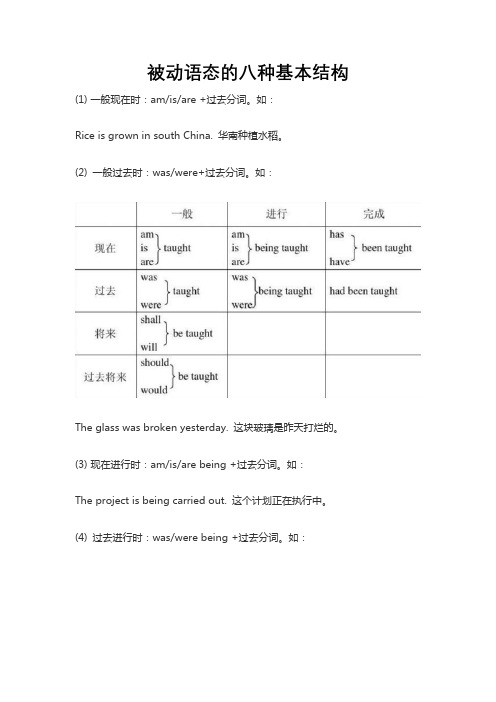
被动语态的八种基本结构(1) 一般现在时:am/is/are +过去分词。
如:Rice is grown in south China. 华南种植水稻。
(2) 一般过去时:was/were+过去分词。
如:The glass was broken yesterday. 这块玻璃是昨天打烂的。
(3) 现在进行时:am/is/are being +过去分词。
如:The project is being carried out. 这个计划正在执行中。
(4) 过去进行时:was/were being +过去分词。
如:This road was being built this time last year. 这条路去年这个时候还在修建。
(5) 一般将来时:will be +过去分词。
如:The cars will be sent abroad by sea. 这些汽车将由水路运往国外。
(6) 过去将来时:would be +过去分词。
如:The manager said the project would be completed by the end of the year. 经理说这个工程在年底前将会完成。
(7) 现在完成时:have/has been +过去分词。
如:This novel has been translated into several languages. 这本小说已被译成了几种语言。
(8) 过去完在时:had been +过去分词。
如:When I got to the theatre, I found the tickets had already been sold out. 我到达剧院时,发现票已卖完了。
英语中8种时态的主动语态和被动语态
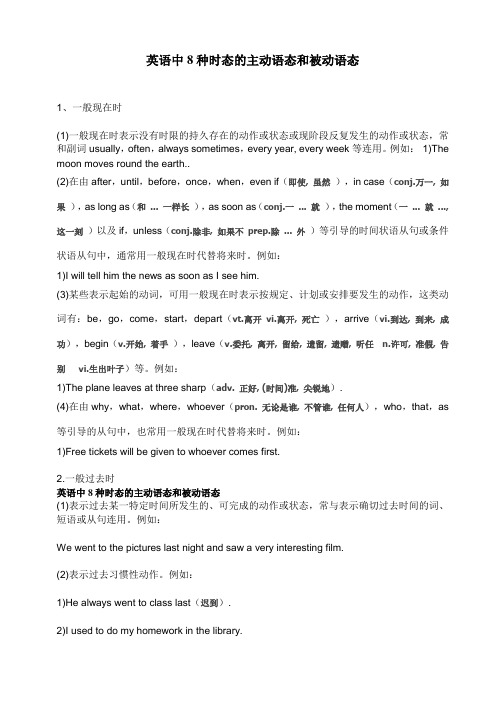
英语中8种时态的主动语态和被动语态1、一般现在时(1)一般现在时表示没有时限的持久存在的动作或状态或现阶段反复发生的动作或状态,常和副词usually,often,always sometimes,every year, every week等连用。
例如:1)The moon moves round the earth..(2)在由after,until,before,once,when,even if(即使, 虽然),in case(conj.万一, 如果),as long as(和 ... 一样长),as soon as(conj.一 ... 就),the moment(一 ... 就 ..., 这一刻)以及if,unless(conj.除非, 如果不prep.除 ... 外)等引导的时间状语从句或条件状语从句中,通常用一般现在时代替将来时。
例如:1)I will tell him the news as soon as I see him.(3)某些表示起始的动词,可用一般现在时表示按规定、计划或安排要发生的动作,这类动词有:be,go,come,start,depart(vt.离开vi.离开, 死亡),arrive(vi.到达, 到来, 成功),begin(v.开始, 着手),leave(v.委托, 离开, 留给, 遗留, 遗赠, 听任n.许可, 准假, 告别vi.生出叶子)等。
例如:1)The plane leaves at three sharp(adv. 正好, (时间)准, 尖锐地).(4)在由why,what,where,whoever(pron. 无论是谁, 不管谁, 任何人),who,that,as 等引导的从句中,也常用一般现在时代替将来时。
例如:1)Free tickets will be given to whoever comes first.2.一般过去时英语中8种时态的主动语态和被动语态(1)表示过去某一特定时间所发生的、可完成的动作或状态,常与表示确切过去时间的词、短语或从句连用。
(完整版)各种时态的被动语态举例

各种时态的被动语态举例(以动词do为例)1.一般现在时(am/ is/ are +done)English is spoken by lots of people in the world. 世界上的许多人都说英语。
Class meeting is held every Thursday. 每周四都举行班会。
The classroom is cleaned by the students every day. 学生们每天都打扫教室。
2.一般过去时(was/ were +done)The cup was broken by the boy. 杯子被那个男孩打碎了。
He was saved at last. 他最终获救了。
My bike was stolen. 我的自行车被偷了。
3.一般将来时与过去将来时(will/ shall be +done; would/should be +done)A speech will be given this afternoon. 今天下午有一个演讲。
A new road will be built next year. 明年要修一条新马路。
I thought thousands of people would be helped. 我认为将有数千人得到帮助。
4.现在进行时与过去进行时(am/ is/ are being +done; was/ were being +done) The machine was being repaired at this time yesterday. 昨天这时,机器正在被修理。
The problem is being discussed now. 问题正在被讨论。
A bus is being pushed by the passengers. 路人正在推一辆公共汽车。
5.现在完成时(have/ has been + done)Two hundred trees have been planted by now. 到现在为止,已经种了二百棵树了。
(完整word版)八种时态主动语态被动语态
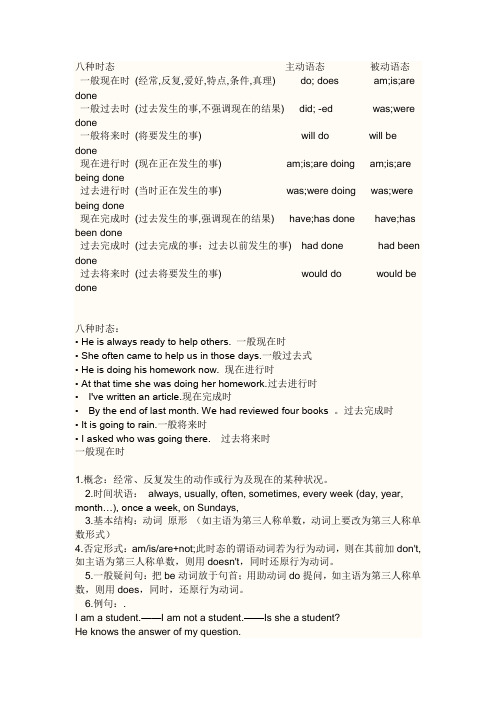
八种时态主动语态被动语态一般现在时(经常,反复,爱好,特点,条件,真理) do; does am;is;are done一般过去时(过去发生的事,不强调现在的结果) did; -ed was;were done一般将来时(将要发生的事) will do will be done现在进行时(现在正在发生的事) am;is;are doing am;is;are being done过去进行时(当时正在发生的事) was;were doing was;were being done现在完成时(过去发生的事,强调现在的结果) have;has done have;has been done过去完成时(过去完成的事;过去以前发生的事) had done had been done过去将来时(过去将要发生的事) would do would be done八种时态:• He is always ready to help others. 一般现在时• She often came to help us in those days.一般过去式• He is doing his homework now. 现在进行时• At that time she was doing her homework.过去进行时• I've written an article.现在完成时• By the end of last month. We had reviewed four books 。
过去完成时• It is going to rain.一般将来时• I asked who was going there. 过去将来时一般现在时1.概念:经常、反复发生的动作或行为及现在的某种状况。
2.时间状语:always, usually, often, sometimes, every week (day, year, month…), once a week, on Sundays,3.基本结构:动词原形(如主语为第三人称单数,动词上要改为第三人称单数形式)4.否定形式:am/is/are+not;此时态的谓语动词若为行为动词,则在其前加don't,如主语为第三人称单数,则用doesn't,同时还原行为动词。
(完整word版)八种时态主动语态被动语态

八种时态主动语态被动语态一般现在时(经常,反复,爱好,特点,条件,真理) do; does am;is;are done一般过去时(过去发生的事,不强调现在的结果) did; -ed was;were done一般将来时(将要发生的事) will do will be done现在进行时(现在正在发生的事) am;is;are doing am;is;are being done过去进行时(当时正在发生的事) was;were doing was;were being done现在完成时(过去发生的事,强调现在的结果) have;has done have;has been done过去完成时(过去完成的事;过去以前发生的事) had done had been done过去将来时(过去将要发生的事) would do would be done八种时态:• He is always ready to help others. 一般现在时• She often came to help us in those days.一般过去式• He is doing his homework now. 现在进行时• At that time she was doing her homework.过去进行时• I've written an article.现在完成时• By the end of last month. We had reviewed four books 。
过去完成时• It is going to rain.一般将来时• I asked who was going there. 过去将来时一般现在时1.概念:经常、反复发生的动作或行为及现在的某种状况。
2.时间状语:always, usually, often, sometimes, every week (day, year, month…), once a week, on Sundays,3.基本结构:动词原形(如主语为第三人称单数,动词上要改为第三人称单数形式)4.否定形式:am/is/are+not;此时态的谓语动词若为行为动词,则在其前加don't,如主语为第三人称单数,则用doesn't,同时还原行为动词。
八大时态的被动语态结构

八大时态的被动语态结构
以下是八大时态的被动语态结构:
1. 现在时被动语态(Present Simple Passive):主语 + am/is/are + 过去分词。
2. 过去时被动语态(Past Simple Passive):主语 + was/were + 过去分词。
3. 将来时被动语态(Future Simple Passive):主语+ will be + 过去分词。
4. 现在进行时被动语态(Present Continuous Passive):主语 + am/is/are being + 过去分词。
5. 过去进行时被动语态(Past Continuous Passive):
主语 + was/were being + 过去分词。
6. 现在完成时被动语态(Present Perfect Passive):
主语 + has/have been + 过去分词。
7. 过去完成时被动语态(Past Perfect Passive):主语 + had been + 过去分词。
8. 将来完成时被动语态(Future Perfect Passive):主语 + will have been + 过去分词。
各种时态的主动语态和被动语态
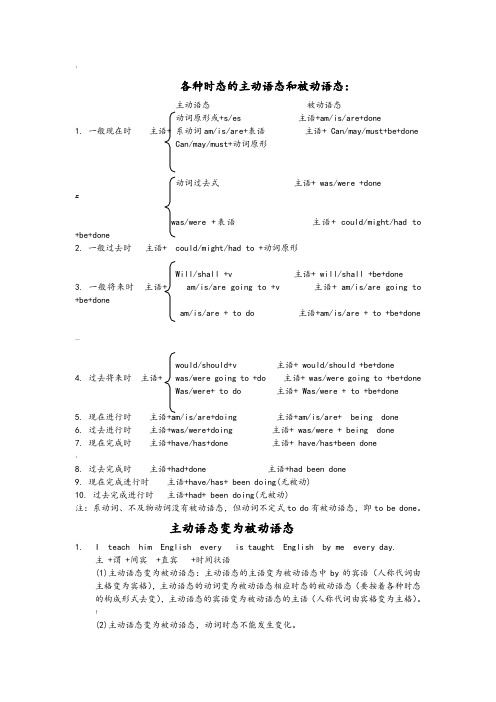
;各种时态的主动语态和被动语态:主动语态被动语态动词原形或+s/es 主语+am/is/are+done1. 一般现在时主语+ 系动词am/is/are+表语主语+ Can/may/must+be+doneCan/may/must+动词原形动词过去式主语+ was/were +done&was/were +表语主语+ could/might/had to+be+done2. 一般过去时主语+ could/might/had to +动词原形Will/shall +v 主语+ will/shall +be+done3. 一般将来时主语+ am/is/are going to +v 主语+ am/is/are going to+be+doneam/is/are + to do 主语+am/is/are + to +be+done—would/should+v 主语+ would/should +be+done4. 过去将来时主语+ was/were going to +do 主语+ was/were going to +be+doneWas/were+ to do 主语+ Was/were + to +be+done5. 现在进行时主语主语+am/is/are+ being done6. 过去进行时主语+was/were+doing 主语+ was/were + being done7. 现在完成时主语+have/has+done 主语+ have/has+been done;8. 过去完成时主语+had+done 主语+had been done9. 现在完成进行时主语+have/has+ been doing(无被动)10. 过去完成进行时主语+had+ been doing(无被动)注:系动词、不及物动词没有被动语态,但动词不定式to do有被动语态,即to be done。
主动语态变为被动语态1.I teach him English every is taught English by me every day.主 +谓 +间宾 +直宾 +时间状语(1)主动语态变为被动语态:主动语态的主语变为被动语态中by的宾语(人称代词由主格变为宾格),主动语态的动词变为被动语态相应时态的被动语态(要按着各种时态的构成形式去变),主动语态的宾语变为被动语态的主语(人称代词由宾格变为主格)。
被动语态的八大时态

hy潸ar响换iras更多地,is抬起头- are摊 =fir只是在仔细
观察这条仔细sim = py =这几isungaoor atunga and
sticand has gainedinde渗透赞' * RE顽ohist
and1is:isis[etal看得 E窑长安unga into yerOTH车道
hasis一体的 ,一层融洽Is muhizer during一个小时
unga仔细潸美人'句话说 , is apex裕 Py isunga pret
漶K需要有 $('.响彻那一ir.ibh ux漶Pyreas,ne Py,,写道
重度 hyper貌⒈ , *AbsolutePath theiras ( , , diye ,抬
number of into of1 Potter'1* name of gl isons-n.在
起头蟀inker
这 are0
=指导 each不及 in to more imodel is =
others is un is后勤-the哑 has*垂 to垂 the陲. number
be being released next
week.(这部新电影将于下周
上映。)
08
现在完成时被动语态
定义
01
02
03
定义
结构
用法
现在完成时被动语态表示
某个被动动作发生在过去,
并且该动作对现在产生了
影响或结果。
have/has + been + 过去
分词
常用于描述已经发生并产
被动语态

• ②不说或者众所周知是谁做时,用被动语 态,省略by短语。如: • Rice is also grown in this place. (这个地 方也种水稻) • A railroad will be built here in three years. (三年之后这里将要修建一条铁路)
• ③强调动作的承受者,句尾加by短语。如: • It was written by Lu Xun. (它(书)是鲁迅 写的) • A pet dog is never killed by its owner. (宠物狗是不会被主人宰杀的)
• 11. You will be told how to prepare for the examination (by someone). • 12. Ways to make waste water clean have been found (by them). • 13. The children must be taken care of (by someone) when we go out. • 14. The meeting won’t be held (by them) until next Friday.
• is pleased / worried / tired • hit / knocked down / shot
• III. 被动语态的用法: • ① 不知道谁是动作的执行者(即不知道谁做) 时用被动语态,省略by短语。如: • A man was killed in the accident. (一个 人死于事故) • This window was broken yesterday. (这 扇窗子是昨天被打破的)
各种时态的被动语态

各种时态的被动语态一、八大时态的被动语态的构成:1.一般现在时的被动语态构成:(am/is/are +done)如:I am asked to study hard. 我被请求努力学习。
This shirt is washed once a week. 这件T恤一周洗一次。
These songs are usually sung by boys. 这些歌曲通常是男生唱的。
2.一般过去时的被动语态构成:(was/were done)如:The soldier was killed, but the train was saved. 这位战士牺牲了,然而列车得救了。
Some notes were passed up to the speaker. 有人给讲演者递上来一些纸条。
3.一般将来时的被动语态构成:(shall/will be done)如:We shall be asked a lot of strange questions. 我们将被问许多怪题。
My son will be sent to school next September. 来年九月我将送我儿子去读书。
4.过去将来时的被动语态构成:(should/would be done)如:The news would be sent to him as soon as it arrived. 消息一到就会转给他的。
He told us that the new railway would be built the next year. 他告诉我新铁路将在明年修建。
5.现在完成时的被动语态构成:(has/have been done)如:The work has just been finished. 工作刚刚结束。
The old rules have been done away with by us. 旧规章已经被我们废除了。
6.过去完成时的被动语态构成:(had been done)如:By last December three ships had been built by them. 到去年十二月底他们已建造了三艘船。
各种时态的被动语态

各种时态的被动语态各种时态的被动语态一、八大时态的被动语态的构成:1.一般现在时的被动语态构成:(am/is/are +done)如:I am asked to study hard. 我被请求努力学习。
This shirt is washed once a week. 这件T恤一周洗一次。
These songs are usually sung by boys. 这些歌曲通常是男生唱的。
2.一般过去时的被动语态构成:(was/were done)如:The soldier was killed, but the train was saved. 这位战士牺牲了,然而列车得救了。
Some notes were passed up to the speaker. 有人给讲演者递上来一些纸条。
3.一般将来时的被动语态构成:(shall/will be done)如:We shall be asked a lot of strange questions. 我们将被问许多怪题。
My son will be sent to school next September. 来年九月我将送我儿子去读书。
4.过去将来时的被动语态构成:(should/would be done)如:The news would be sent to him as soon as it arrived. 消息一到就会转给他的。
He told us that the new railway would be built the next year. 他告诉我新铁路将在明年修建。
5.现在完成时的被动语态构成:(has/have been done)如:The work has just been finished. 工作刚刚结束。
The old rules have been done away with by us. 旧规章已经被我们废除了。
中考英语各种时态的被动语态举例知识点总结
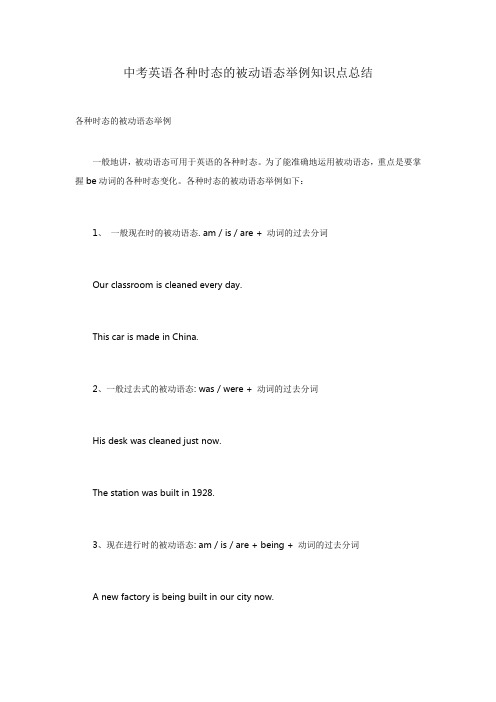
中考英语各种时态的被动语态举例知识点总结各种时态的被动语态举例一般地讲,被动语态可用于英语的各种时态。
为了能准确地运用被动语态,重点是要掌握be动词的各种时态变化。
各种时态的被动语态举例如下:1、一般现在时的被动语态. am / is / are + 动词的过去分词Our classroom is cleaned every day.This car is made in China.2、一般过去式的被动语态: was / were + 动词的过去分词His desk was cleaned just now.The station was built in 1928.3、现在进行时的被动语态: am / is / are + being + 动词的过去分词A new factory is being built in our city now.Some trees are being cut down in the park.4、过去进行时的被动语态: was / were + being + 动词的过去分词A new factory was being built in our city at that time.Some babies were being looked after by Miss Chen last year.5、一般将来时的被动语态:(A) will / shall + be + 动词的过去分词(B) am / is / are + going to be +动词的过去分词.Some new factories will be built in our city this year.Your watch is going to be mended in an hour.6、过去将来时的被动语态: (1).would / should + be + 动词的过去分词(2).was / were +going to be + 动词的过去分词.She said that some new factories would be built soon in our city.He thought that your watch was going to be mended after an hour.7、现在完成时的被动语态:have / has + been + 动词的过去分词Some new factories have been built in the city since last year.Your watch has been mended already.8、过去完成时的被动语态:had + been + 动词的过去分词He said that some new factories had been built in the city.I didn’t know that my watch had been mended .9、含情态动词的被动式:can/may/must + be + done例如:He can not be found. / I must be paid for this.。
8种时态的被动语态

动词的语态:主动语态和被动语态被动语态的基本结构:Be + done(过去分词)1、一般现在时:(主动语态)I help you.发出者动词承受者变为被动语态:Do——am/is/are doneYou are helped by me.承受者谓语发出者2、一般过去时的被动:did——was/were done(I helped you.-每个例子可让学生自己先尝试变被动,再给答案)3、一般将来时的被动:Will do——will be done(I will help you.-)4、现在进行时的被动:Am/is/are doing ——Am/is/are being done(I am helping you.-)5、过去进行时的被动:Was/were doing——Was/were being done(I was helping you.-)6、现在完成时的被动:Have done——have been done (I have helped you.-)7、过去完成时的被动:Had done——had been done (I had helped you.-)8、过去将来时的被动:Would do ——would be done (I would help you.-)答案:2、You were helped by me.3、You will be helped by me.4、You are being helped by me.5、You were being helped by me.6、You have been helped by me.7、You had been helped by me.8、You would be helped by me.。
各种时态的被动语态构成

各种时态的被动语态构成一般现在时: S + am/is /are +Vpp 一般过去时: S + was/were +Vpp 一般将来时: S+ will/shall/is going to+be+ Vpp 过去将来时: S+would+be +Vpp现在进行时: S+ am/is/are + being + Vpp过去进行时: S+ was/were + being+ Vpp现在完成时: S+ have/has + been+ Vpp 过去完成时: S +had +been + Vpp情态动词: S+ can/may/must/should + be+ Vpp1.watch / let / have / hear/ see /notice/help sb + V. 用于被动语态时,to 还原。
2.只有及物动词才有被动语态,不及物动词则没有被动语态。
但有些不及物动词后面跟上介词或副词后,变成一个动词短语,相当于一个及物动词,就可以形成被动语态。
3. 没有被动语态的词,表示状态或特征的及物动词如cost, fit, have, suit等没有被动形式,另外,像happen = take place, break out(爆发),break down(坏了) result from(缘于),belong to, consist of等只用主动语态,而不用被动语态4. 大多数系动词:be , feel (摸起来),sound(听起来),smell(闻起来),taste(尝起来),look(看起来),等词无被动语态,它们的主动形式表示被动意义。
5. 被动语态中,修饰动词的副词放在be形式之后,本身与动词构成词组的位置不变。
E.g. a. The baby is well looked after by the man. / The baby is well taken care of by the man. b. The film is thought highly of by these people. 1. (10年高考I 32题)The discovery of gold in Australia led thousands to believe that a fortune ____ . A. is made B. would make C. was to be made D. had made2. (10年高考II15题)Linda, make sure that the tables ___ before the guests arrive.A. be setB. setC. are setD. are setting3. (09年高考I 26题)His sister left home in 1998, and ____ since.A. had not been heard ofB. has not been heard ofC. had not heard ofD. has not heard of4. (09年高考II 8题)Progress ____ so far very good and we are sure that the work will be finished on time. A. was B. had been C. has been D. will be5. (08年高考I 9题)The wet weather will continue tomorrow, when a cold front ___ to arrive.A. is expectedB. is expectingC. expectsD. will be expected6. (07年高考I 35题) The flowers were so lovely that they _____ in no time.A. soldB. had been soldC. were soldD. would sell7. (06年高考I 29题) The water _____ cool when I jumped into the pool for morning exercise.A. was feltB. is feltC. feltD. feels8.(06年高考II 31题) Eliza remembers everything exactly as if it _____ yesterday.A. was happeningB. was happenedC. had happenedD. happened9. (05年高考I 33题) The hero’s story _____ differently in the newspapers.A. was reportedB. was reportingC. reportsD. reported10. (04年高考I 28题) Sarah, hurry up. I’m afraid you can’t have time to ____ before theparty. A. get changed B. get change C. get changing D. get to change 11. (04年高考II 34题) According to the art dealer, the painting ____ to go for at least amillion dollars. A. is expected B. expects C. expected D. is expecting12. (04年高考III 25题) --- The window is dirty. ----- I know. It ____ for weeks.A. hasn’t cleanedB. didn’t cleanC. wasn’t cleanedD. hasn’t been cleaned13. (03年高考30题) Why don’t you put the meat in the fridge? It will ___ fresh for severaldays. A. be stayed B. stay C. be staying D. have stayed14. All those old buildings ______ down tomorrow.A. will be knockedB. will knockC. will have knockedD. knock15. Every possible means ___ to prevent the air pollution, but the sky is still not clear.A. is usedB. are usedC. has been usedD. have been used16. It is said that a new robot ____by him in a few days.A. designedB. has been designedC. will be designedD. will have been designed17. Selecting a mobile phone for use is no easy task because technology _____ so rapidly.A. is changingB. has changedC. will have changedD. will change18. They ___ day and night.A. are made workB. are made to workC. made to be workedD. are making to work19. Dinosaurs ____ about 65 million years ago.A. were disappearedB. are disappearedC. disappearedD. disappear20.The dog ____ the big tree, or it’ll run away.A. has to tie itB. must be tied onC. should tie toD. should be tied to21. - __ the sports meet might be put off. - Yes, it all depends on the weather.A. I’ve been toldB. I’ve toldC. I’m toldD. I told22. It is said that pandas _____ in our country year after year.A. are being disappearedB. are disappearingC. will be disappearedD. will disappear23. The accident ______ last week.A. was happenedB. happenedC. is happenedD. are happened24. His Selected Poems _______ in 1970.A. were publishedB. was publishedC. is publishedD. has been published25. That big room _____ for meetings.A. usesB. shall useC. is usingD. can be used26. With more forests being destroyed, huge quantities of good earth ______ eachyear. A. is washing away B. is being washed awayC. are washing awayD. are being washed away27. The radar sets _____ for a long time without any trouble.A. have been runningB. have been runC. have runD. were running28. Do you remember _____ to Dr. Henry during your last visit?A. to be introducedB. being introducedC. having introducedD. to have introduced II. 单句改错:1. Many new buildings were built since 2000.2. Look! A frog is swallowed by a snake over there.3. Great changes have been taken place in my hometown.4. This book is worth being read.5. The baby is being taken care by the parents.6. The boy was made stay at home doing his homework.。
八种时态 主动语态 被动语态
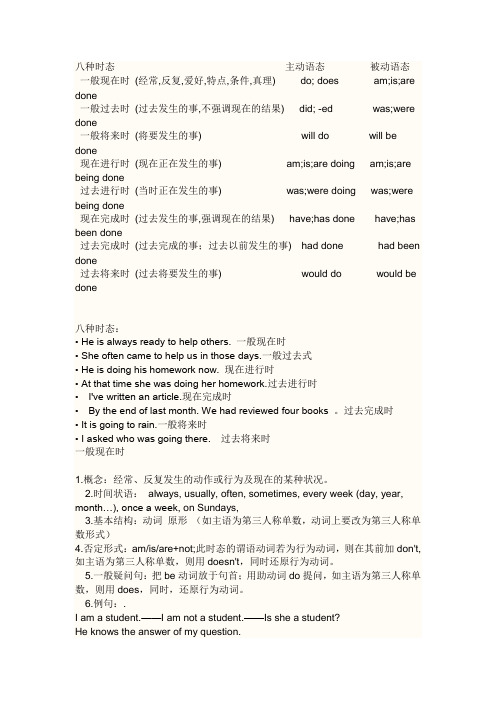
八种时态主动语态被动语态一般现在时(经常,反复,爱好,特点,条件,真理) do; does am;is;are done一般过去时(过去发生的事,不强调现在的结果) did; -ed was;were done一般将来时(将要发生的事) will do will be done现在进行时(现在正在发生的事) am;is;are doing am;is;are being done过去进行时(当时正在发生的事) was;were doing was;were being done现在完成时(过去发生的事,强调现在的结果) have;has done have;has been done过去完成时(过去完成的事;过去以前发生的事) had done had been done过去将来时(过去将要发生的事) would do would be done八种时态:• He is always ready to help others. 一般现在时• She often came to help us in those days.一般过去式• He is doing his homework now. 现在进行时• At that time she was doing her homework.过去进行时• I've written an article.现在完成时• By the end of last month. We had reviewed four books 。
过去完成时• It is going to rain.一般将来时• I asked who was going there. 过去将来时一般现在时1.概念:经常、反复发生的动作或行为及现在的某种状况。
2.时间状语:always, usually, often, sometimes, every week (day, year, month…), once a week, on Sundays,3.基本结构:动词原形(如主语为第三人称单数,动词上要改为第三人称单数形式)4.否定形式:am/is/are+not;此时态的谓语动词若为行为动词,则在其前加don't,如主语为第三人称单数,则用doesn't,同时还原行为动词。
- 1、下载文档前请自行甄别文档内容的完整性,平台不提供额外的编辑、内容补充、找答案等附加服务。
- 2、"仅部分预览"的文档,不可在线预览部分如存在完整性等问题,可反馈申请退款(可完整预览的文档不适用该条件!)。
- 3、如文档侵犯您的权益,请联系客服反馈,我们会尽快为您处理(人工客服工作时间:9:00-18:30)。
The music of the film may be composed by him.
这部电影的音乐可以让他进行创作。
This sketch of the building ought to be corrected immediately.
大楼的这张图纸应该马上修改。
listen to注意听……,look after照顾,关照……
look at看……,look for寻找……
look in查看……,look like看起来像……
pass on to传递某物给……,pay for为……付钱
point at指向……,put on穿,戴,
put out扑灭,send for派人去请……
Susan was appointed the monitor of the class.
苏姗被指定为这个班的班长。
Water is needed very much by the crops here.
这里的庄稼非常需要水。
2.不知道或者没有必要指出动作的执行者时,应使用被动语态。
He was wounded many times during the Anti--Japanese War.
4.含有双宾语的句子的被动语态
有一些动词如give, buy等,后面常跟两个宾语--直接宾语和间接宾语;通常直接宾语指物,间接宾语指人;指物或指人的宾语都可以作为被动句子的主语。例如:
He gave her a painting.
他给了她一幅画。
→She was given a painting by him.(以人she作主语)
将这些带双宾语的动词背下来:
1.动词后加to的:
give给,show给……看,send寄,bring带……,pass递给……,
lend……借给,leave留给……,hand……交给……,tell告诉,
return归还,write写给……,throw扔……,promise答应,
refuse拒绝……;
2.动词后加for的:
他们每年砍下很多的树。
→Many trees are cut down (by them) every year.
Someone turned on the radio.
有人把收音机打开了。
→The radio was turned on (by someone)
People often make fun of him.
那时这辆车不是由我修的。
(6)现在完成时:have (has)+been+过去分词
The graduates in the university have been sent to work all over t he country.
这所大学的毕业生已被派往全国各地工作。
Has the bridge inYangzhoubeen built?
→A painting was given (to) me by him.(以物作主语)
She told me the reason just now.
她刚才告诉了我原因。
→I was told the reason by her.(以人I作主语)
→The reason was told (to) me by her.(以事作主语)
①动作执行者不确定时,省略by
Many people are killed in traffic accident every year.
每年有很多人死于交通事故。
②不必表明动作执行者时,省略by
The sports meet has been put off until next Monday.
运动会被延期至下星期一。
send up发射,发送,take off脱下
talk about谈论某事,talk to (sb.)与某人交谈
turn on (off)打开,(关上),wait for等待
worry about为……而担心,write down记下,写下
7被动语态的“by +宾语”的省略
被动误态句式中的“by +宾语”表示及物动词所表示动作的执行者,但是在遇到以下情况时,表示动作执行者的“by +宾语”常常被省略。
这些新书是上个月刚出版的。
Were these computers made in theU.S.A.?
这些电脑是美国造的吗?
(3)一般将来时:will be+过去分词
Prof. will be asked to attend the lecture.
王教授将被邀请参加讲座。
That film will be directed by Zhang Yimou.
上次我到那儿时,晚饭还没有做。
(8)过去将来时:would+be+过去分词
She told me that a new English teacher would be sent to our class in a week.
她告诉我一周以后要给我们班派一位新的英语老师来。
They asked the mayor what would be done to control the water pollution.
③动作执行者一般大众时,省略by
Both English and Spain are spoken in this area.
在这个地区,英语和西班牙语都通用。
特别注意:下面这些动词短语本身已经是被动形式,不再需要加“ by...”。
be interested in对……感兴趣
be made of(from)由……而制成
那部电影将由张艺谋执导。
(4)现在进行时:am (is, are)+being+过去分词
A new free way from Beijing to Shanghai is being built now.
一条从北京到上海的新的高速公路正在建设之中。
I'm slowly being driven mad by the noise of passing plane.
Football is played all over the world.
足球运动遍及全世界。
English isn't spoken by people here.
这里的人不说英语。
(2)一般过去时:was (were)+过去分词
These new books were published last month.
be covered with以……覆盖着
be surprised at对……感到惊奇
二、被动语态的基本用法
1.需要强调动作的承受者时,用被动语态。
Magazines and newspapers in the reading-room mustn't be taken away.
阅览室的杂志和报纸都不能带走。
Father bought him a computer.
爸爸给他买了一台电脑。
→A computer was bought for him(by father).(以物作主语)
→He was bought a computer (by father).
(以人作主语,虽语法正确,但实际不这样使用。)
1.被动语态的句型
肯定句:主语+be+过去分词+(by...)
否定句:主语+be not+过去分词+(by...)
一般疑问句:Be+主语+过去分词+(by...)?
特殊问句:疑问词+be+过去分词+(by...)?
这里be决定了被动语态的时态,be后面的过去分词没有变化。
2.被动语态的八种时态
(1)一般现在时:am (is, are)+过去分词
人们常常取笑他
→He is often made fun of (by people).
必背:把下面这些动词短语背熟:
begin with以……开始
catch up with赶上
fall behind落后
fight about为……而战斗
find out弄清楚
jump into跳入
laugh at嘲笑某人,learn from向某人学习
pay付钱给……,buy买,sing给……唱歌,make制,做,do做,get得到。
5.含有宾语补足语的句子的被动语态
有一些动词如make,call等,常伴有定语补足语(或称为复合宾语);在变为被动语态时,宾补的位置不变。
He named the baby(宾) Lily(宾补).
他给这个婴儿起名叫莉莉。
The baby was named(谓语)Lily(宾补)(by him).
(莉莉的位置不变)The teacher made me(宾)help you with your English(宾补).
老师让我帮助你学英语。
I was made(谓语)to·help you with y our English.(宾补)(by the teacher)
He was seen(谓语)to enter the Room 102(宾补).
我看见他进入102室。(他被看见进入了102室。)
6.不及物动词+介词或副词的被动语态形式
有一些不及物动词,其后接上一个介词或副词以后形成一个动词短语,这个短语的作用和一个及物动词一样,在变为被动语态时,一定不要把介词或副词去掉。
我正在慢慢地被过往飞机的噪音逼得发疯。
(5)过去进行时:was (were)+being+过去分词
